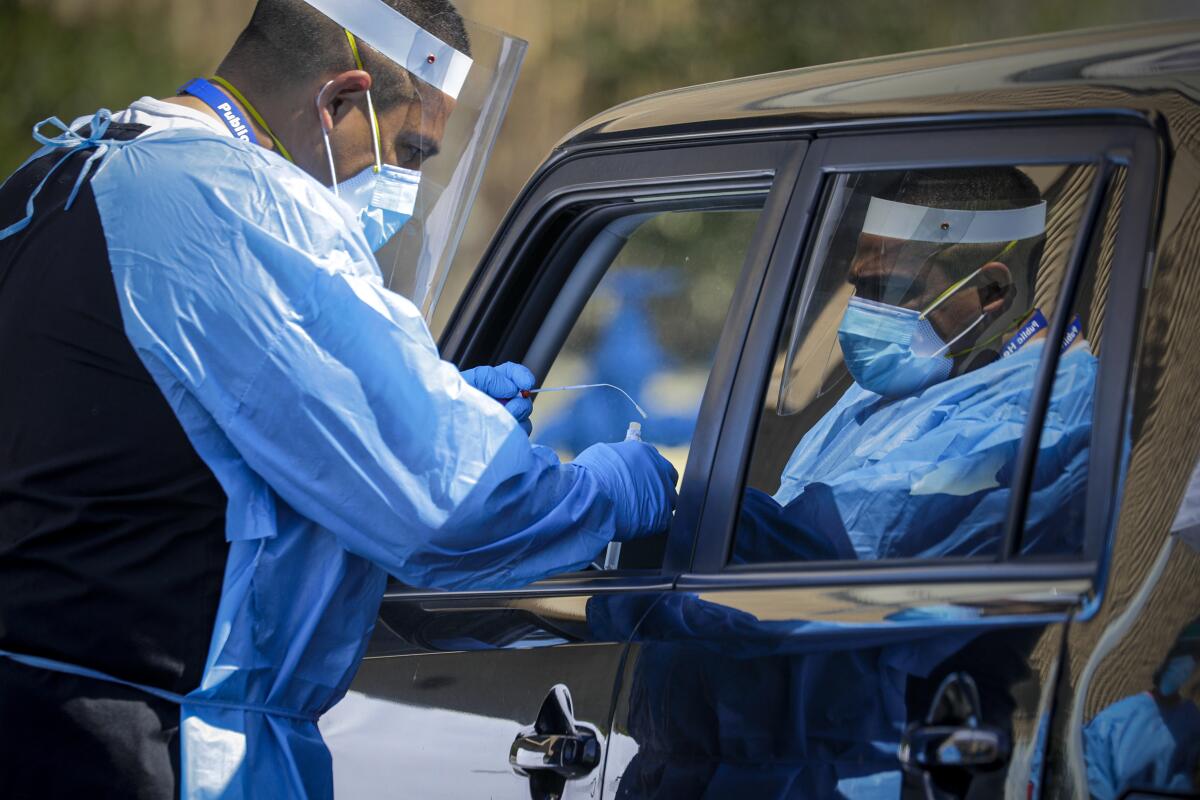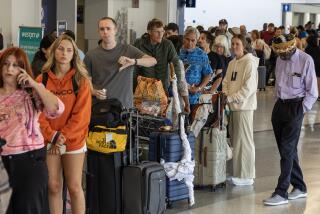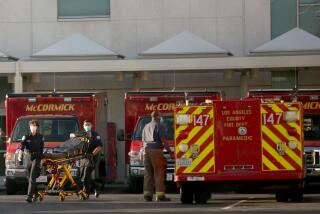San Bernardino County cancels hundreds of coronavirus test appointments, citing shortage

- Share via
San Bernardino County health officials have had to cancel hundreds of appointments for people who signed up to get coronavirus tests, citing a shortage in materials.
“The county’s daily testing capacity has shrunk from about 4,500 to about 1,800,” public information officer David Wert said, adding that the county’s test vendors “are unable to procure supply.”
“What the county is experiencing is part of the nationwide supply chain crisis.”
The county of 2.18 million residents, where more than 167,000 have been tested for the virus and over 16,500 have tested positive, hopes to resume expanded testing next week after obtaining enough supplies.
“We are continuously trying to obtain the necessary resources to ensure that we can provide testing in our county at peak capacity,” said Corwin Porter, interim county public health director. “Without a sufficient supply of tests, this will bring challenges in identifying cases and treating those who are diagnosed positive for COVID-19.”
Priority will now be given to those showing symptoms, who work in a high-risk environment or who have come in contact with a person known to have been exposed to the virus.
Testing has remained one of the only available weapons to fight against the virus in the ongoing absence of a vaccine or medical therapies, and officials throughout the state and country have encouraged widespread and regular testing. But as case counts and hospitalizations continue to surge, demand for testing has continued to spike beyond capacity.
On Saturday, California Health and Human Services Secretary Dr. Mark Ghaly announced that laboratories should prioritize testing turnaround for individuals who are symptomatic, hospitalized or living in congregate settings, such as nursing homes, or institutional settings, including jail facilities.
“As more states begin to scale their testing capabilities, new constrains are materializing within the supply chain. Simultaneously laboratories are becoming overwhelmed with high numbers of specimens, slowing down processing timelines. These delays will present significant challenges in (1) our ability to care for people in the hospital where testing helps us make appropriate treatment decisions and (2) our ability to appropriately isolate those who are sick in order to box in the virus and cut transmission rates,” Ghaly wrote in a statement.
In Los Angeles County, where more than 1 million tests have been distributed, officials said that the demand for testing has outpaced the county’s current supply.
On Wednesday, county officials shifted priority on guidance for who should get tested for the virus. After weeks of stressing that all individuals — including potential asymptomatic spreaders — should be tested, public health officials placed priority on those who are showing symptoms, work in a high-risk environment or have come in contact with a person known to have been exposed to the virus.
“The mismatch of demand has become more apparent,” L.A. County Health Services Director Dr. Christina Ghaly said. “We have to watch the supply chain.”
Los Angeles Mayor Eric Garcetti echoed the sentiment during a briefing Wednesday night. Garcetti said that there was more testing capacity than demand in the city two weeks ago, but that capacity was stretched last week.
Both asymptomatic and symptomatic residents have reported difficulty in finding appointments for testing for the past three weeks. Availability was further limited last week leading up to Fourth of July holiday weekend and on Monday, when Dodger Stadium — the largest testing site in the county — was closed for testing.
“We see choke points nationally in the supply chain — everything from reagents to some of the swabs, and the surge in states like Texas, Florida and Georgia, have caused labs to be past their capacity across the county,” Garcetti said, noting that has not been the case at the six city test sites run by Curative labs and nonprofit group Community Organized Relief Effort, or CORE.
The mayor said that the city is working to expand testing capacity, but he stressed that people should not get tested in order to socialize outside of their households.
“A test is not a passport to party,” he said.
More to Read
Sign up for Essential California
The most important California stories and recommendations in your inbox every morning.
You may occasionally receive promotional content from the Los Angeles Times.















